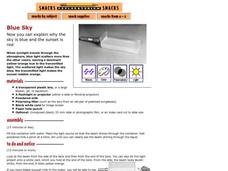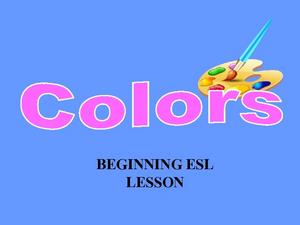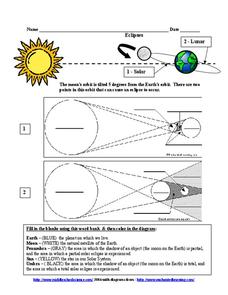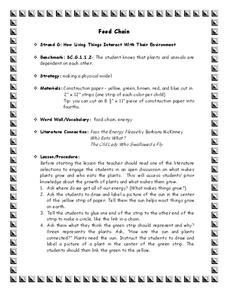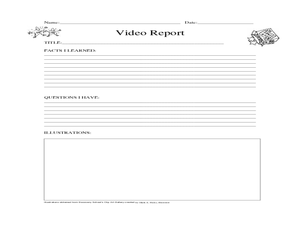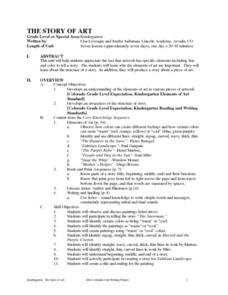Curated OER
Color the Picture According to a Key
In this coloring worksheet, students follow the key to color correctly a picture of a sleeping child who is dreaming of sailing on the ocean.
Curated OER
Starlight, Star Heat
In this stars worksheet, students read how astronomers calculate the temperature of a star by measuring its color. Students use a chart showing star temperatures and colors to complete 3 short answer questions.
Exploratorium
Blue Sky
Use a container full of water as a prism and show that as light is bent, the individual colors from different wavelengths become visible. This explains why the sky appears to be blue midday, and why as the sun nears the horizon, it looks...
Curated OER
Introduction to Photovoltaic Systems
The Green Education Foundation found that this lesson plan, written by the Texas State Energy Conservation Office, is right up their alley when it comes to teaching sustainability. It is ideal as a first lesson plan on photovoltaic...
Curated OER
African Savanna Habitat Diorama Craft
Set the stage for a unit or lesson on the African savanna by creating a cute habitat diorama. Cheetahs, lions, zebras, and elephants are all present in a shoe-box-sized craft that requires your learners to color, cut, and paste. These...
Curated OER
Solar System Bead Distance Activity
Students create a scaled solar system model using colorful beads. In this space science lesson, students convert AU units into metric measurements. They arrange the planets according to their distances from the sun.
Curated OER
Fast Fact-Finding
Ever wonder why the sky changes color so often? Readers examine an informational excerpt from John Farndon's How the Earth Works. They underline key points as they read and then answer five response questions. Prompts review main...
Curated OER
Making Models of the Solar System
Students make several models of the solar system to learn the positions of the planets in the solar system as well as relative distances and sizes. Creation of these models will help them identify the planets by size, shape, color,...
Glynn County School System
Light, History, Gravity, Distance, Relativity, and Space-Time
Let the star's color be the guide! The color of a star indicates its temperature and its mass and distance affect the gravitational force. The lesson presentations address these concepts as well as how the theory of special relativity...
Curated OER
Sensational Colors
In this writing worksheet, students prepare to write a poem about a color they have chosen. First students think about descriptive words pertaining to their color and the 5 senses. The students then write the poem and evaluate it using a...
Curated OER
Fusion Confusion
Learners are introduced to three types of energy transfer: conduction, convection, and radiation. They model the scientific process of fusion to become with the sun and how it produces energy.
Curated OER
Colors: Beginning ESL Lesson
Explore the vivid world of colors with this straightforward ESL presentation. Each slide presents a color word in its color (the word "red" is colored red) and a picture to accompany the word. The presentation would be a good review tool...
NASA
Solar System Scale & Size
Use a variety of whole fruits to represent the different planets in the solar system to introduce scale sizes to your math or space science class. They follow suit by creating a non-scaled model of the solar system using specific-colored...
Curated OER
Technicolors
Students use a variety of computer games and programs to reinforce colors. In this colors lesson plan, students create scenes, view degrees of colors, see colors dance to music, and more.
Curated OER
Eclipses
For this eclipses worksheet, learners are given diagrams of a solar and lunar eclipse. They fill in each diagram with given terms and color the diagram to indicate the process for each type of eclipse.
Community Consolidated Schools District 168
Solar System Model Project
Challenge young astronomers to demonstrate their knowledge of the solar system with this fun open-ended science project. Provided with a short list of requirements, students are given the freedom to use their creativity and whatever...
ESL Kid Stuff
Our World
There's a beautiful world all around us! Learn about the features of our planet with a series of activities designed for English learners. Kids sing, dance, and read about nature with fun lessons and interactive play.
Curated OER
Food Chain
Students discuss what makes plants grow and who eats the plants. They are asked where do we get all of our energy? Students are asked to draw and label a picture of the sun in the center of the yellow strip of paper. They are explained...
Curated OER
How Hot and How Big?
Students explore star color and size. In this space science instructional activity, students conduct various inquiry activities to explore how the color of a star affects the amount of heat produced. They also investigate how the color...
Curated OER
Nature Print Silk Suncatchers
Students are introduced to the beauty of silk painting. They create a colorful leaf-print sun catcher that glows when placed in a window. Each student experiences the mixing of the colors and tie a link with Asian cultures, science and...
Curated OER
Rooster's Night Out
Students explore folktales. For this folktale lesson, students listen to a story from another country and discuss the characters. Students retell the story using puppets and do coloring sheets. Students do a sequencing cut and paste...
Curated OER
Gazing At Cosmic Pinballs
Learners explore the world of stars. They see that the color of a star tells how hot or cold it is, that stars come in different sizes. and that stars are moving through space. They draw lines connecting start to star.
Curated OER
The Story of Art
Students canvass the important elements of art in the seven lessons of this unit. Story structure and in particular, color is perceived as essential to the development of the idea of a picture.
Curated OER
Do Different Colors Absorb Heat Better?
Pupils work together to test how the color of a material affects how much heat it absorbs. They make predictions and take notes on their observations. They discover how engineers use this type of information.


